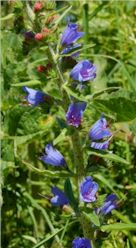|

Viper Bugloss |
The Simpler's passing consideration should be given to this tall handsome English herb which grows frequently in gravel pits, and on walls. It belongs to the Borage tribe, and in common with the Lungwort (Pulmonaria), the Comfrey, and the ordinary Bugloss, abounds in a soft mucilaginous saline juice. This is demulcent to the chest, or to the urinary passages, being also slightly laxative. Bees favour the said plants, which are rich in honey.
Each herb goes by the rustic name of "Abraham, Isaac, and Jacob," because bearing spires of tricolored flowers, blue, purple, and red. The Viper's Bugloss is called botanically Echium, having been formerly considered antidotal to the bite of (Echis) a viper: and its seed was thought to resemble the reptile's head: wherefore such a curative virtue became attributed to it after the doctrine of signatures. "In Echio, herba contra viperarum morsus celeberrima, natura
semen viperinis capitibus simile procreavit." Similarly the Lungwort (or Jerusalem Cowslip), because of its spotted leaves, was held to be a remedy for diseased lungs. This rarely grows wild, but it is of frequent cultivation in |
cottage gardens, bearing also the rustic name, "Soldiers and Sailors," "To-day and to-morrow," and "Virgin Mary." From either of these herbs a fomentation of the flowers, or a decoction of the whole bruised plant, may be employed with benefit locally to sore or raw surfaces: whilst an infusion made with three drams of the dried herb to a pint of boiling water will be good in feverish pulmonary catarrh. By our ancestors viper broth was thought to be highly invigorating: and
vipers cooked like eels were given to patients suffering from ulcers. The Sardinians still take them in soup. Marvellous powers were supposed to be acquired by the Druids through their possession of a viper's egg, laid in the air, and caught before reaching the earth. All herbs of the Borage order are indifferently "of force and virtue to drive away sorrow and pensiveness of the mind: also to comfort and strengthen the heart." With respect to the
Comfrey, quite recently the President of the Irish College of Surgeons has reported the gradual disappearance of a growth ("malignant, sarcomatous, twice recurrent, and of a bad type"), since steadily applying poultices of this root to the tumor. "I know nothing," says Professor Thomson, "of the effects of Comfrey root: but the fact that this growth has simply disappeared is one of the greatest surprises and puzzles I have met with."
Herb Simples
The Primitive Simplers presented here show the way of life in other generations, it is not suggested or recommended trying them yourself. |
|
Garden
Herbs
Home
History of Herbs
Herb Gardening
Herbs for Beginners
Drying & Preserving Herbs
Indoor Herb Gardening
Herb Garden
Hints & Tips
Herbal
Cooking
Herb Chart
Using Herbs
Culinary Herbs
Herb
Oil and Vinegar
Herb Teas
Herb Candy
Herb Jelly
Herb Simples
Preface
Introduction
Alphabetical Listing

Trade
Recipes Online
Share your Recipes with others!!
|


